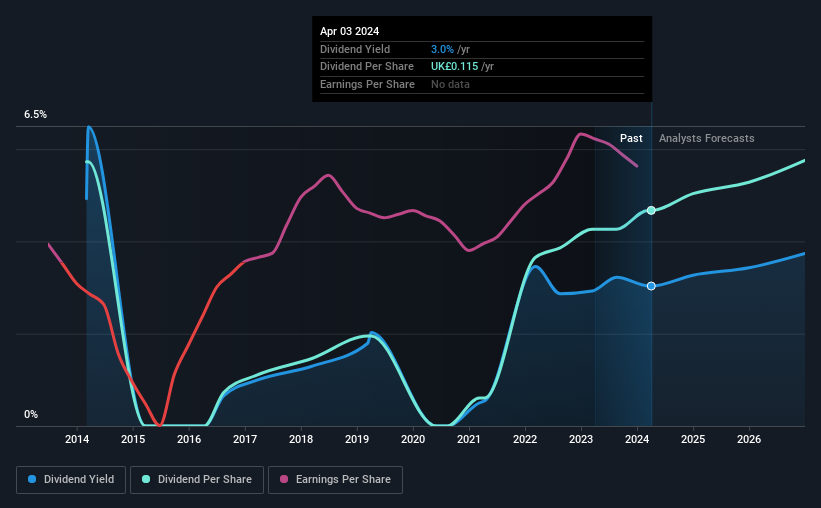Balfour Beatty (LON:BBY) Is Increasing Its Dividend To £0.08
Balfour Beatty plc (LON:BBY) has announced that it will be increasing its dividend from last year's comparable payment on the 3rd of July to £0.08. The payment will take the dividend yield to 3.0%, which is in line with the average for the industry.
Check out our latest analysis for Balfour Beatty
Balfour Beatty's Payment Has Solid Earnings Coverage
We like a dividend to be consistent over the long term, so checking whether it is sustainable is important. Before making this announcement, Balfour Beatty was easily earning enough to cover the dividend. This means that most of its earnings are being retained to grow the business.
Looking forward, earnings per share is forecast to rise by 21.8% over the next year. If the dividend continues along recent trends, we estimate the payout ratio will be 24%, which is in the range that makes us comfortable with the sustainability of the dividend.
Dividend Volatility
Although the company has a long dividend history, it has been cut at least once in the last 10 years. Since 2014, the annual payment back then was £0.141, compared to the most recent full-year payment of £0.115. Doing the maths, this is a decline of about 2.0% per year. Generally, we don't like to see a dividend that has been declining over time as this can degrade shareholders' returns and indicate that the company may be running into problems.
The Dividend Looks Likely To Grow
With a relatively unstable dividend, it's even more important to see if earnings per share is growing. It's encouraging to see that Balfour Beatty has been growing its earnings per share at 14% a year over the past five years. A low payout ratio and decent growth suggests that the company is reinvesting well, and it also has plenty of room to increase the dividend over time.
Balfour Beatty Looks Like A Great Dividend Stock
In summary, it is always positive to see the dividend being increased, and we are particularly pleased with its overall sustainability. Distributions are quite easily covered by earnings, which are also being converted to cash flows. All in all, this checks a lot of the boxes we look for when choosing an income stock.
Investors generally tend to favour companies with a consistent, stable dividend policy as opposed to those operating an irregular one. At the same time, there are other factors our readers should be conscious of before pouring capital into a stock. For instance, we've picked out 2 warning signs for Balfour Beatty that investors should take into consideration. If you are a dividend investor, you might also want to look at our curated list of high yield dividend stocks.
Have feedback on this article? Concerned about the content? Get in touch with us directly. Alternatively, email editorial-team (at) simplywallst.com.
This article by Simply Wall St is general in nature. We provide commentary based on historical data and analyst forecasts only using an unbiased methodology and our articles are not intended to be financial advice. It does not constitute a recommendation to buy or sell any stock, and does not take account of your objectives, or your financial situation. We aim to bring you long-term focused analysis driven by fundamental data. Note that our analysis may not factor in the latest price-sensitive company announcements or qualitative material. Simply Wall St has no position in any stocks mentioned.

 Yahoo Finance
Yahoo Finance 
